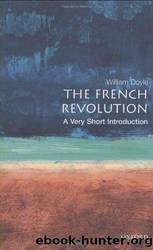The French Revolution: a very short introduction by William Doyle

Author:William Doyle [Doyle, William]
Language: eng
Format: epub
Tags: General, Europe, History - General History, History, France, Regional History, History: World, European history (ie other than Britain & Ireland), Modern history to 20th century: c 1700 to c 1900, European history, Revolutionary, Social & cultural history, c 1700 to c 1800, Revolutionary groups & movements, European history: c 1750 to c 1900, European history: c 1500 to c 1750, Revolution; 1789-1799, France - History - Revolution; 1789-1799, Europe - France, Revolutions; uprisings; rebellions, France - History - Revolution And Napoleonic Empire (1789-1815)
ISBN: 9780192853967
Publisher: Oxford University Press
Published: 2001-02-15T05:00:00+00:00
Chapter 4
What it ended
The initial impulse of the French Revolution was destructive. The revolutionaries wanted to abolish what, by the end of 1789, everybody was calling the old or former order, the ancien régime. When, in the summer of 1791, the Constituent Assembly finalized the constitution on which it had been working since June 1789, the deputies thought it would be useful in such a fundamental document to list the main things that their revolution had got rid of, what they called âthe institutions which wounded liberty and equality of rightsâ. And so the constitution declared that:
There is no longer either a nobility or a peerage, or hereditary distinctions, or distinctions of orders, or a feudal regime, or any of the corporations or decorations for which proofs of nobility were required, or which implied distinctions of birth, or any other superiority but that of public officials in the exercise of their duties.
There is no longer venality or heredity of public office. There is no longer for any part of the nation or for any individual any privilege or exception to the common law of all the French. There are no longer either guilds, or corporations of professions, arts and crafts.
65
The law no longer recognizes either religious vows or any other engagement contrary to natural rights and the constitution. The list was far from exhaustive. In the constitution, it came immediately after the Declaration of the Rights of Man and the Citizen, which by proclaiming a number of principles of political and civil life, implicitly condemned practices opposed to them in previous times. The extended declaration which prefaced the never-implemented constitution of 1793 made this even more clear: âThe necessity of declaring these rights presupposes the presence or the recent memory of despotism.â As the Revolution proceeded, the range of its destructive ambitions widened. By 1793 they were so comprehensive that an outraged priest coined a new word to describe them: vandalism, evoking the anti-Christian depredations of ancient barbarians. On the other hand, the Revolutionâs destructive achievements often fell far short of its ambitions; and what the men of 1789 or 1793 thought they tionluo had abolished forever often reappeared, and quite soon, in forms ve R ostensibly different but which those who had survived had no difficulty hc
ren
in recognizing with dismay.
Fe
Th
Despotism
The Revolution began as an attack on despotism. Montesquieu had defined it in De lâEsprit des lois (1748) as the rule of one, according to no law. Obeying no law, despotic authority was arbitrary, and its animating spirit was fear. As usual, regular usage soon diluted the original rigour of the wordâs meaning. Already by 1762, Rousseau was implying in his Social Contract that there was no meaningful difference between the authority of a despot and that of a monarch. By the end of that decade despotism was widely understood as the abuse of monarchical power, and indeed of any sort of authority. By 1789 this had come to mean above all imposing taxation without consent, arbitrary powers of arrest
Download
This site does not store any files on its server. We only index and link to content provided by other sites. Please contact the content providers to delete copyright contents if any and email us, we'll remove relevant links or contents immediately.
| Africa | Americas |
| Arctic & Antarctica | Asia |
| Australia & Oceania | Europe |
| Middle East | Russia |
| United States | World |
| Ancient Civilizations | Military |
| Historical Study & Educational Resources |
Never by Ken Follett(3154)
The Man Who Died Twice by Richard Osman(2515)
Machine Learning at Scale with H2O by Gregory Keys | David Whiting(2513)
Fairy Tale by Stephen King(2403)
Will by Will Smith(2255)
Rationality by Steven Pinker(1900)
The Dark Hours by Michael Connelly(1740)
The Dawn of Everything: A New History of Humanity by David Graeber & David Wengrow(1728)
Friends, Lovers, and the Big Terrible Thing by Matthew Perry(1587)
Can't Hurt Me: Master Your Mind and Defy the Odds - Clean Edition by David Goggins(1530)
Principles for Dealing With the Changing World Order: Why Nations Succeed and Fail by Ray Dalio(1509)
A Short History of War by Jeremy Black(1431)
Go Tell the Bees That I Am Gone by Diana Gabaldon(1353)
HBR's 10 Must Reads 2022 by Harvard Business Review(1353)
515945210 by Unknown(1295)
Oathbringer (The Stormlight Archive, Book 3) by Brandon Sanderson(1266)
Fear No Evil by James Patterson(1179)
443319537 by Unknown(1140)
Works by Richard Wright(1100)
